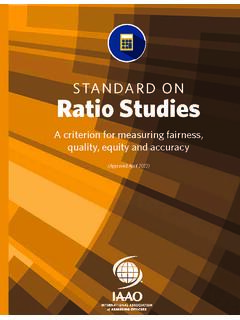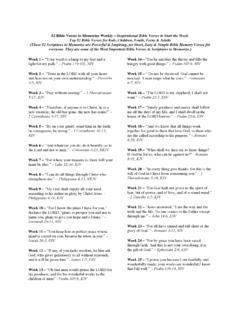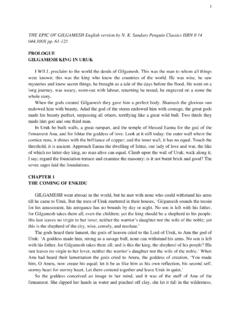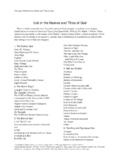Transcription of A Brief History of Property Tax - IAAO
1 3 Fair & Equitable February 2005 COVER STORY Ancient TimesThe earliest known tax records, dating from approximately six thousand years , are in the form of clay tablets found in the ancient city-state of Lagash in modern day Iraq, just northwest of the Tigris and Euphrates Rivers. The king used a tax system called bala, which meant rota-tion. The assessors would focus on one area of the city-state, assessing and taxing one area each month, thereby breaking down the arduous task into more manageable components. (This is a lesson that we have used in pres-ent day Boston by not attempting to focus on all Property in a revaluation year. Instead, we focus great attention on the valuation of retail and industrial Property during one year, following up the next year with apartments or other sub-sets of Property . This allows a thorough review of the various components of value and ultimately leads to better assessments.)
2 In Lagash taxes were very low, but in a time of crisis or war the tax rate was ten percent of all goods, which were primarily composed of food. You can have a Lord, you can have a King, but the man to fear is the tax assessor. ~ Anonymous citizen of LasgashProperty taxes were used in Egypt, Babylon, Persia, and China and throughout the ancient world. Most people were poor and lived in hovels. The primary focus of early Property taxation was land and its production value. Ancient Egypt had a thriving culture that began around 5,000 and lasted thousands of years. Taxes were levied against the value of grain, cattle, oil, beer and land. Ap-proximately one in a hundred people were literate; they were called scribes. Some of the scribes were tax assessors. They kept records about who owned title to lands along with the size of their fields. At various times they collected annual or biannual data by counting cattle and checking the crop yields.
3 The most common taxpayers were the farmers, from whom assessors coerced collection. If a taxpayer did not or was not able to pay, he was brought before courts that immediately dispensed justice. A typical tax rate was ten percent of all production. Tax assessors were highly valued people because of their skills with hieroglyphics and their ability to collect revenue. Often when a king died, the as-sessor was the only staff person not killed and buried along with the king, so valued was his service. There were tombs and monuments for assessors in Egypt and Syria that rivaled those of some kings. In Egypt, the famous Rosetta Stone was actually a tax document granting exemption to priests. Be weary of strong drink. It can make you shoot at tax and miss. ~ Robert HeinleinTax assessors were also highly valued officials in ancient Greece. Near the Acropolis there is a monument to the honest tax assessor. The Athenian general Aristides (530 468 ) completely reformed the Property tax as-sessment system of Athens while serving as treasurer ( , assessor).
4 Known as the most competent and impartial person who ever held the position in Athens, Aristides acted in the interests of the city above all else. His prestige was so great that be became known as Aristides the Just. The good and fair tax system established by Aristides fell apart during the Peloponnesian War (Sparta vs. Athens, A Brief History of Property TaxBy Richard Henry CarlsonThis paper was initially delivered at the IAAO Conference on Assessment Administration in Boston, Massachusetts, on September 1, 2004. Taxation has existed in various forms since civilization began. In days of old the source of wealth was land and its proceeds. Before the existence of a monetary system, taxes were paid by a percentage of crops raised. Through most of History , the tax assessor and the tax col-lector were the same person; therefore, tax collector is used interchangeably with tax assessor throughout the following paper.)
5 Some of the most common forms of taxation over the millennia were poll taxes, tariffs on goods, and Property taxes on the value of land, build-ings, and other personal Property . The purpose of this paper is to present some of the major moments in the History of real and personal Property taxation. Let s take a short walk through time to understand what we have in common with our ancestor assessors, what we can learn from them, and how developed the current Property tax system has come to be. 4 Fair & Equitable February 2005431 404 ). Athenian citizens complained that real and personal Property taxes were too high and de-manded that the government lower expenditures. The tax assessment system was also perceived as biased and inefficient compared to the ear-lier standards set by Aristides. The Athenian council decided to reduce Property taxes but increased both tariffs and tributes paid by council allies.
6 The tribute from each ally was calculated according to the value of Property that came under each state. Taxes assessed in Athens and Attica (Athens s territory) were assessed ac-cording to the value and productivity of the land, with the more productive lands receiving higher assessments. As the Peloponnesian War dragged on, the Athenians increased the tribute expected from allies to the breaking point. The tribute was doubled and then doubled again. Ultimately, Athens ran out of money and lost the the Great (356 323 ) conquered the known world. While he was a military genius, he was also an able administrator. As he moved through Persia, India, Egypt and other parts of his world, he left ad-ministrators with explicit instructions on how to implement Property taxes. Specifically, he was concerned that there would be revolts in areas that were already conquered. When there were, he was brutal in stopping them.
7 Prior to his conquest, the people were very heavily taxed, and the collected money typically went to the treasury of the king, not to public improvements. Alexander s tack was to substantially cut taxes and use half of the raised funds for public improvements (wa-ter systems, roads, ports, etc.) while keeping the remaining half for his treasury. Therefore, the people not only paid fewer taxes while receiving more benefits for their taxes, but they were also far less likely to revolt against his administrators. From roughly 200 to 300 , Romans paid Property taxes on the val-ue of land, buildings, livestock, trees, vines and other personal Property . When Julius Caesar was preparing for the Gaulic campaign, one of his gen-erals told him there was not enough money to pay for the needed materi-als. Caesar s response was, Send out the assessors! Pothinus once asked Ju-lius Caesar, Is it possible that Caesar, the conqueror of the world, has time to occupy himself with such a trifle as our taxes?
8 Caesar s response My friend, taxes are the chief business of a conqueror of the world. Only little people pay taxes. ~ Leona HelmsleyEarly Roman administrations had tax policies with intended outcomes. Prior to Augustus Caesar, the state sold the rights to collect taxes to private citizens. These people would make significant profits by enforcing Roman tax law. Today we call such people con-sultants. Augustus put an end to the practice by making Roman assessors public employees. In the early years of the Roman Republic, the tax rate was just one percent of value (land, buildings and all personal Property including plants and animals). The tax rate climbed during war and crisis to three percent. However, as Rome expanded public benefits the budget was stretched. Prior to Julius Caesar, over 300,000 people received food from the state. Caesar thought that many of these people should be working instead of receiving public benefits and therefore cut the number of recipients of public welfare in half.
9 The result was that expenditures went down, and with more people plowing fields, the tax revenue increased. Augustus Caesar was greatly con-cerned that people were not produc-ing at maximum levels and made other adjustments to the system. One of the more important advances was a reassessment based on flat land rates. He implemented a valuation system based not on what a farmer produced but what a farmer could produce. If a farmer worked hard and produced more crops than a less productive neighbor, he still paid the same in Property taxes. Economic incentive and maximum use of the land was at the heart of his taxation policy. The tax rate for wealthy farmers became one percent of value per year. Other Roman emperors were far less insightful. Tiberius Caesar cut back on public improvements and retained huge portions of tax in his treasury. This resulted in a financial crisis where money was in short supply.
10 Over time there were other emperors who implemented disastrous policies that were largely to blame for the col-lapse of the empire. Public expendi-tures increased with more expensive entertainment. Entire months of the year became holidays and public wel-fare systems became very generous. Over time, fewer people produced goods and the tax rates began to soar. Some emperors wanted to reduce the wealthy Senate class and taxed the value of their estates so high that the Property was confiscated or the own-ers were driven away or into hiding. The emperors also began to reduce the silver content of coins. This practi-cally destroyed the economy. In fact, some Property owners tried to give themselves up as slaves until it was declared illegal to do so by Emperor Valens (368 ). Eventually the system so completely broke down that there was no longer a monetary system and trade went back to barter. Of course with no ability to pay an army, the entire system collapsed and the barbarians invaded Rome.













